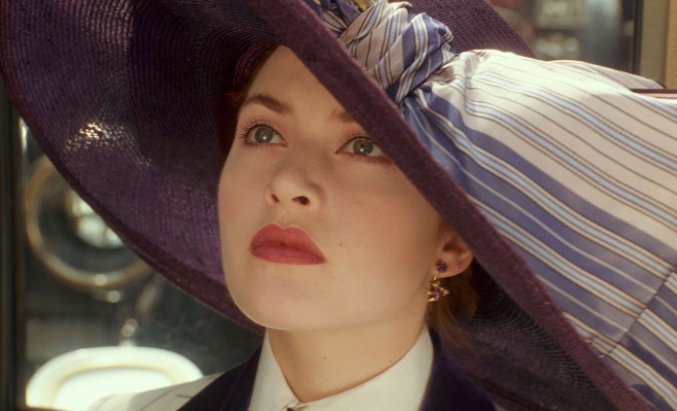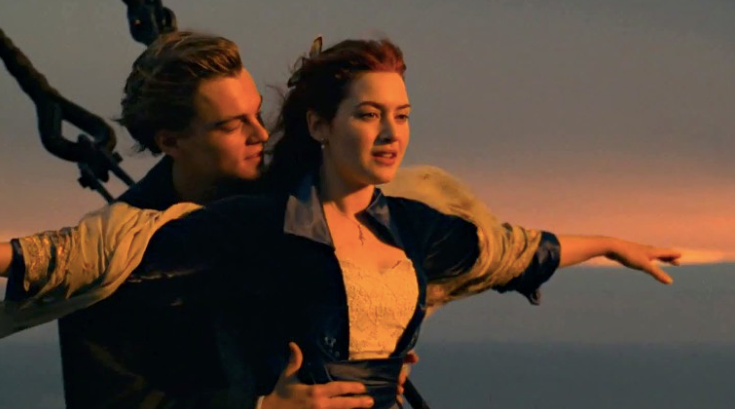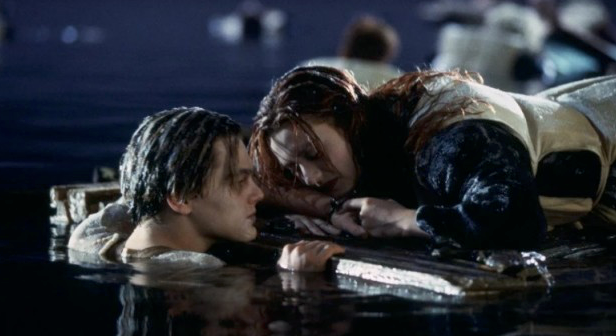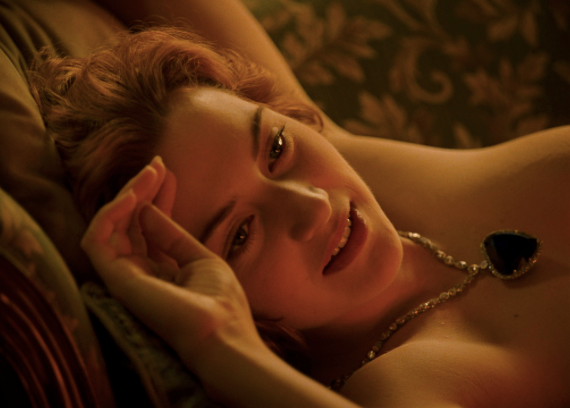I recently re-watched the movie Titanic while on an airplane. In retrospect this was probably not the best idea given that I’m a nervous flyer and the movie is about a bunch of people dying a horrible death on board a large ocean-crossing vehicle. But we made it through — well, I made it through, I can’t actually say the same for Leo and all the other poor souls on board the “unsinkable” ship. (Luckily Leo — that’s Leonardo DiCaprio to you — is just an actor and no heartthrobs were actually harmed in the making of Titanic.) But the point of all this (I really do have a point, I swear) is that I noticed something about the movie I’d never noticed before: it’s actually kind of feminist.
Now, you all know how I feel about modern feminism (and if you don’t, hi, I’m Faith, this is my blog, read a few posts and you’ll get the hang of things), but I actually kind of like what’s going on in Titanic. Not necessarily because of Rose’s big feminist breakaway from her uptight, constraining family, but because of how she gets there, and what it says about feminism.
Titanic is a movie that inspires big emotions. Some people love it, some people hate it, some people really really hate it, and some people wonder if the whole thing is actually about time travel. But what the movie’s really about — other than, you know, a really big ship that sinks in the Atlantic Ocean — is a woman finding the courage to break free from her constraining and oppressive situation in order to live a full and complete life.

Many people — including me — find Rose Dewitt Bukater (played by Kate Winslet) pretty annoying. Whole articles have been devoted to enumerating her many annoying qualities. But the fact that she’s in a difficult situation (even before she’s, you know, almost drowned in a huge boat disaster) is hard to argue with. Her snobbish mother is forcing her to marry a truly abusive and potentially psychotic (but rich) guy named Cal because Rose’s mother is out of money and can’t fathom living in anything other than utter luxury. Not exactly the plight of the starving immigrants in third class I’ll grant you, but looking at it purely from a plot perspective (rather than a historical one) it’s not good.
Jack Dawson (played by Leonardo DiCaprio) is essentially the key to unlocking Rose’s inner feminist and helping her escape from this scenario. (Either that or he’s a time traveller from another dimension but we’ll just leave that particular fan theory alone for now.) Through her interactions with Jack, Rose goes from being ladylike, poised, composed, and perfectly dressed, to learning how to spit, drink beer, yell at people, and (eventually) take off all her clothes and have sex with a man she just met. Sounds pretty much like modern feminists today, right? But the only reason that Rose is able to do any of these things (without getting horribly mistreated or abused) is because Jack truly loves and cares for her and would do anything (does do literally everything) to keep her safe.

Modern feminism only really “works” if men are willing to protect women. A woman who chooses to take off her clothes around — and potentially sleep with — virtual strangers is in far more danger than a woman who doesn’t. This is not the patriarchy rearing its ugly head, it’s just plain common sense. The only way she can do this without getting raped, or mistreated, or humiliated, is if the man she’s doing it with doesn’t take advantage of her (any more than she’s already asking him to). A woman who chooses to scream about her viewpoints in the faces of people in public places can only do this if the man whose face she’s screaming in has enough self-restraint not to punch her in her face. The normalization of bad behavior on the part of women is completely contingent on the willingness of men to continue treating women with some amount of respect — regardless of whether the women actually want it.
Rose is offered the opportunity to flex her feminist wings in the completely safe (aside from the whole sinking boat thing) environment of her relationship with Jack. In real life, Jack could have been all kinds of psycho. We have no idea who he is, really, and what we do know — that he won his Titanic ticket in a poker game and hangs out with prostitutes — isn’t really grounds for assuming he’s a nice guy. But, of course, he is a nice guy (the very nicest). And — in a sort of fairy tale love at first sight scenario — Rose and Jack fall for each other nearly immediately. So, when Rose takes off her clothes and tells Jack to “draw me like one of your French girls,” (and, later, when they’re both fairly naked and she tells him to “put your hands on me, Jack”) she is completely safe because he is completely chivalrous. (Okay, maybe a completely chivalrous guy wouldn’t have slept with her at all, but you get my drift.)
But then the movie kills Jack off. The issue of whether or not both Rose and Jack could have fit on the floating wooden door that saved Rose’s life is not really the point here (he could have fit), and we don’t need to get into it as it’s quite a point of contention in fan circles and is ultimately neither here nor there when it comes to what I’m about to say (but he could have fit). The filmmakers orchestrate a scenario in which Jack chivalrously lets Rose float on the (very large) door while he hangs on nearby with most of his body in the freezing cold water. When one of the lifeboats returns looking for survivors, Rose finds that Jack is dead.

Jack — the movie is telling us — has no place in Rose’s new life. She’s been liberated from patriarchal oppression and the last thing she needs is a man! Rose’s journey isn’t from one (awful) man to another (wonderful) one (oh no! that wouldn’t be feminist at all!), it’s from the horrors of marriage and familial duty, to freedom from oppression and gender norms. She was in a bad situation, she did need to get out of it, but this ending rings false to me.
Modern feminism asserts that there’s no such thing as gender. It’s just a “social construct,” created so that men could keep women down by telling them lies like “we’re physically stronger than you” and “only women can have babies.” But, if men and women are exactly the same or — put another way — if women can (or should) act exactly the same way as men without consequence, then men ought to be allowed to treat women the way they might treat other men. Women don’t need protection from men if they’re exactly the same as them.
But the only way for modern feminists — or Rose Dewitt Bukater — to act like men and stay safe doing it (to the point of feeling “liberated” and “empowered”) is if men continue to act like men and protect them. The instinct that makes Jack let Rose get on the door instead of him, or tell her to get on the lifeboat even though he has to stay behind, or insist he’s going in after her when, at the beginning of the movie, she tries to throw herself off the boat, is a male instinct. It’s the instinct to protect those weaker than himself. Jack surely wanted to have sex with Rose when she took off all her clothes and asked her to draw him, but he didn’t take advantage of her then (or ever) because of his instinct to protect her. If women insist on acting like men and that masculinity itself is “toxic,” then they are sure to find themselves in all kinds of situations in which they would be justified in claiming #MeToo.

Rose gets the life she gets because of Jack. Because of his willingness to protect her, care for her, support her, and fight for her. “Promise me,” Jack tells her before he dies, “you will survive.” And Rose promises. At the end of the film we learn that Rose has lived a full “feminist” life — flying airplanes, riding horses, fishing, modeling provocatively for photos — thereby keeping her promise. But it’s a life she only had the courage to live because she learned to live it via her interactions with a truly chivalrous and protective man. A good man who didn’t take advantage of her sudden foray into “liberated” feminism.
Rose’s story arc is a “feminist” one, but those of us who actually enjoy the movie (and think that door was definitely big enough for two) wish Jack could have made it to the end. We wish she could have married him, and raised a family with him, and rode horses and flown airplanes and gone fishing with him. Because we know that, in real life (which I’ll admit this movie bears little resemblance to), a woman who acts like a modern feminist and expects men to ditch “toxic” behaviors like chivalry and protectiveness is in for a world of hurt. Rose gets a great life, but she gets it because of the love of a good man.
Jack is a perfect picture of male disposability and before anyone asks no I’m not an MRA I am egalitarian trad woman.
Unlike the superfluous undefinable catch-all idea of the patriarchy, male disposability been with us for a long time. However traditional societies we’re often structured in a way to reward men who often risked it all.
But it is interesting to look at the history of universal suffrage and at the women who opposed suffrage made the point they couldn’t hold the same responsibilities as men such as serving the military, fire brigade, and other numerous responsibilities men had.
What’s more once women gained the vote they used it to free themselves from even more traditional responsibilities they had such as duties to children, even to the point of killing their unborn child.
That’s the real problem of feminism. It gets all the rights but none of the responsibilities and if women want to be taken seriously we must accept them.
LikeLiked by 1 person
I haven’t seen the movie, but I know the plot pretty well. I love what you drew out of it!
LikeLike
Thank you!
LikeLike
Well done piece and your observations are right on point – Jack as a chivalrous male who gives up his life so a rather flawed and selfish woman can live a feminist life. From the masculinist point of view, Jack chose poorly. He allowed his libido and protective instincts to over ride sound decision making. ( Proverbs 31:10-31)
Also glad to see that you are now expanding the blog beyond the rather limited world of Disney into Hollywood in general.
LikeLiked by 1 person
“Modern feminism only really “works” if men are willing to protect women. A woman who chooses to take off her clothes around — and potentially sleep with — virtual strangers is in far more danger than a woman who doesn’t. This is not the patriarchy rearing its ugly head, it’s just plain common sense.” This encapsulates about everything in feminism and the modern world. A totally delusional world view, zero sum and out of all proportion. If all men were everything many feminists say they are we would be all be living in rapists harems right now. Girl power ain’t a thing like they think it is.
LikeLiked by 1 person
I agree that Rose was able to break out of her oppressive situation because she had Jack who was supportive of her. I also agree that when shit was hitting the fan and their lives were at stake, Jack had an instinct to protect her. However, I think to make the assumption that modern feminism, and the feminism Rose experiences, is only possible when men protect women isn’t correct. First I would like to say that the instinct to protect is masculine, but not necessarily male. Masculinity and Femininity are two different “fields of energy” that anyone can get in touch with, so even if men are more inclined to be masculine and protect it does not mean women cannot and the same goes other way around for feminine traits. My main point I want to make is that throughout the film (before shit really starts hitting the fan) Jack is not protecting Rose. When Jack is drawing Rose naked he isn’t doing her any favors by not raping her or taking advantage of her and he surely isn’t protecting her by not doing this because he is SUPPOSE to not do this. He isn’t protecting her from his urge to rape/take advantage of her because one does not exist nor should it. He may want to have sex with her, but sex requires consents. If he were to have taken advantage of Rose it would make him a bad guy, but by not doing it doesn’t make him a good guy either. Yes, of course, he was a gentleman but being a protective gentleman goes beyond the absence of bad things. Jack was supportive of Rose and this allowed her to flourish. Supportive friends, co-workers, family members, teachers and etc etc can be all someone needs to change their life. Its a superpower we all possess and need from others, but this comes from someone regardless of gender. Jack was a masculine man who supported Rose is a way a good, masculine man would support a woman he loves. He saw her holistically and as a person first and foremost unlike gross Cal. Yet, Rose could have met a woman opposite of her personality, became best of friends, and that friend could have given her the courage to leave her oppressive situation. Now, I understand this idea is a little flawed so I explain those flaws. 1) Her oppressive situation was coupled with a sinking boat and woman of that day may not have been able to save themselves or they would have gotten a life boat together (and if she were a poor friend Rose probably would have gotten her to come on that life boat) and 2) Her oppressive situation was also an issue if the times so Rose may have needed more than just courage to leave (she may needed an alternative.) But in the end Jack died so there was no romantic alternative? I started to spitball a bit so let me get back on track. My point is, protective masculine men have a place in modern feminism but they aren’t a requirement of modern feminism.
LikeLike
BRAVO! I know that it’s been several years since your article was posted, but it’s never to late to offer a big THANK YOU! for both your article and your common sense!
I’ve watched Titanic several times, mostly because of its historic significance and the sheer terror of a huge ship like that sinking to the bottom of the Atlantic. And although I’m a man, I also appreciated it as a romantic tale– despite its heavily feminist-inspired plot.
I’ve often posited the question to people, “Why was it that it was Jack whose lifeless body we saw sinking into the darkness, and not Rose?” I even posted it to a “Get to know the new employee” at a new job I started years ago. Probably imprudent of me, but …. I just couldn’t resist!
I’ve bookmarked your wonderful site!
LikeLiked by 1 person
Thank you! Welcome!
LikeLike